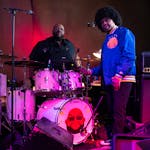A definite holiday buzz was in the air at Orchestra Hall on Saturday evening. A jazz trio tinkled in the lobby, and the tills rang merrily as patrons availed themselves of $5 happy hour pricing.
A "Casual Concert," the Minnesota Orchestra called it. As an initiative to brighten the frequently staid behaviors surrounding live classical music, it certainly felt different. Selfies were being taken, and more families and young people were in the audience than usual.
Inside the hall, it was pretty much business as usual, although Christmas trees flanked either side of the platform, and roving spotlights cast snowflakes around the auditorium.
Onstage, a slimmed-down Minnesota Orchestra and Chorale were on duty, performing the first half of Bach's Christmas Oratorio, a set of cantatas describing the birth of Jesus.
Handel's "Messiah" is the default repertoire for choral concerts at this time of year, and it was refreshing to see an alternative on offer.
For aficionados, the presence of the 84-year-old German conductor and Bach specialist Helmuth Rilling on the podium looked like a significant bonus. On Saturday, the magic ran fitfully. "Jauchzet, frohlocket," the opening chorus of Cantata 1, started scrappily, sputtering to life rather than exploding with elation.
It was further hampered by the Minnesota Chorale's habit of detaching syllables from one another in a faux-staccato fashion. The intention was probably to mimic dance rhythms, but the effect was mannered and quickly irritating.
Rilling's slow tempos were also problematic, creating a generally reverential atmosphere which suited some numbers better than others.
The chorus "Wie soll ich dich empfangen" was a case in point. Beautifully blended harmonies were created by the choir, but Rilling's insistence on slowing down and pausing at the end of each line (a tactic mainly avoided nowadays) caused the piece to sag and lose impetus.
Rilling's largely meditative approach also seemed to tax the solo singers. Mezzo Lidia Vinyes-Curtis struggled to keep her tone focused in "Schlafe, mein Liebster" from Cantata 2, an aria about sleep that itself tended to be soporific.
Tenor Nicholas Phan and baritone Tyler Duncan made a more forthright impression, but both periodically strained against the leash imposed by Rilling's sedate parameters.
The most enjoyable music-making came in Cantata 3. "Herrscher des Himmels," the opening chorus, had more spring in its step, and the mezzo aria "Schliesse, mein Herze" was graced by tasteful violin playing from concertmaster Susie Park.
Is Bach's music all about sublimity? Those who think so had plenty to keep them happy in Rilling's ruminative, palpably affectionate interpretations.
But the wonderful cantatas of the Oratorio also harbor wit, drama, exuberance and unbridled joy. Those were more difficult to find in this show, which pulled its punches in a way that left this listener frustrated.
Terry Blain is a freelance classical music critic for the Star Tribune. Reach him at artsblain@gmail.com.




